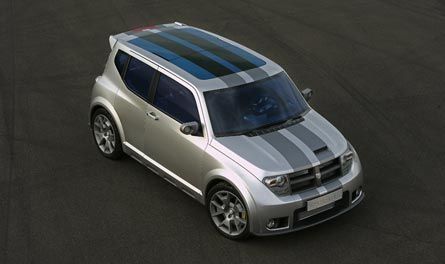Chrysler appears to be distancing itself from Chinese automaker Chery. A scant few months ago, Chery was picked by Chrysler to build a small car for the American market. It had been expected that Chery would be selected to also build another small car for the company, one on which a production version of the concept Dodge Hornet and concept Dodge Demon, among other products could be built. This platform would fit into the so-called B segment of the market, below the C segment Dodge Caliber.
But Chrysler’s top salesman in China, Simon Elliot, CEO of Chrysler Group China Sales, Ltd., says the company is looking for some one other than Chery to do the B segment car. Rumors have Hyundai and Mitsubishi, though it is not clear that the discussions pertain to this project. Hyundai has been forging increasingly close links to Toyota. Mitsubishi, on the other hand, could probably use the business – it has suffered declining sales both in Japan and the United States.
According to Elliot, Chrysler intends to focus on getting new small cars to market, recognizing that the company’s current product line-up offers very little in the smallest platform segments of the market. But that focus appears to be outside of U.S. borders. Chrysler is not only interested in filling the small car segments in the American market. It is interested in selling cars in China. To that end, it recently hired the man who had been in charge of GM’s China operation and most recently worked with GM’s Chinese partner, SAIC Corp., Phil Murtaugh.
Steering clear of Chery appears to be a sound move. Shortly after the deal between Chery and Chrysler was announced, Chery models, including one which is a knock-off of a Chevrolet small car, failed European and Russian crash tests in horrific fashion, with doors sprung open, body structure compromised, seats crushing occupants against the steering wheel. Overall, the vehicles could not have been more completely engineered to kill had they been designed as death traps.
Apart from the obvious engineering shortcomings of Chery’s product offerings, the company has also shown the business ethics of a thief. General Motors sued the company over Chery’s knock off of one of its Chevy models, and Chery settled, paying money and promising not to sell the car outside China. That’s the one that failed the Russian crash test.
Chrysler’s decision to look abroad for a partner to build the B-segment car probably won’t win it any friends at the United Auto Workers, but it makes sense for the company. Chrysler needs to conserve its financial resources and get new products to market as quickly as possible. Rather than investing the time and money required to develop a platform, the company could come out ahead on both by getting a platform already developed by someone else. Chrysler officials have been fairly blunt about this, referring to putting their “hat” on somebody else’s platform.

